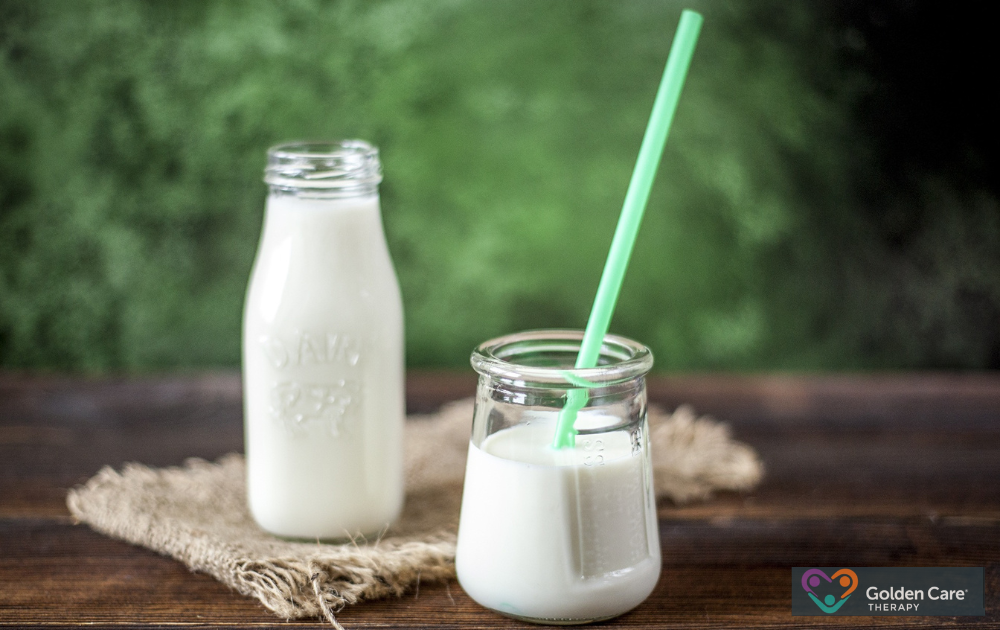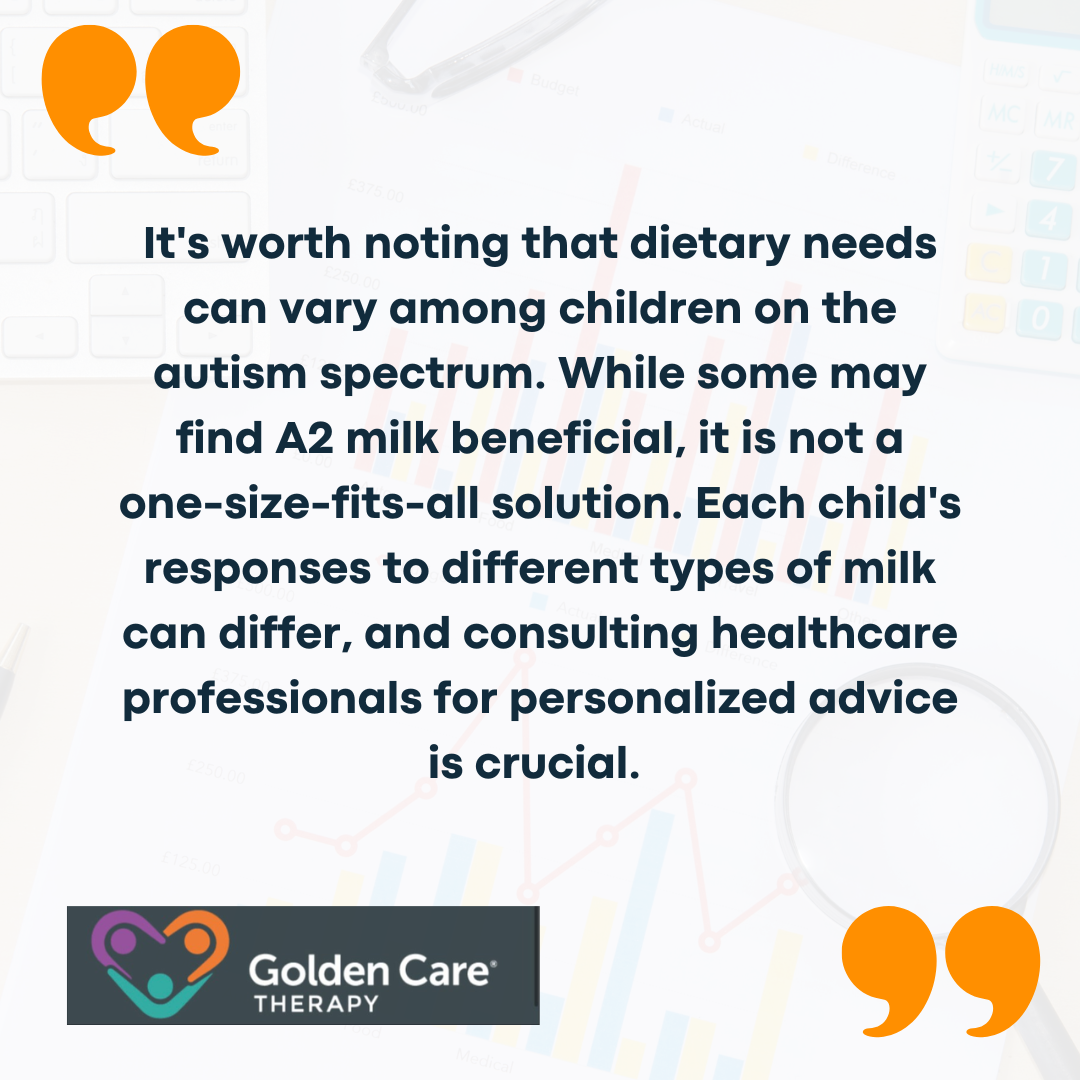As far as milk goes, there are different variants that can have varying effects on our health. One such variant is A2 milk, which has gained attention for its potential benefits, particularly in relation to autism.
But does it really work as what others claim? Let’s find out!

A2 vs. A1 Milk
To understand the significance of A2 milk, it’s important to differentiate it from A1 milk and explore the impact of a compound called BCM-7.
The key distinction between A2 and A1 milk lies in the type of beta-casein protein present. A2 milk contains a different variant of beta-casein protein compared to A1 milk.
While A2 milk is derived from cows that naturally produce this specific protein, A1 milk comes from cows that produce a different variant.
The consumption of A2 milk has been associated, through epidemiological research, with potentially less severe symptoms of autism and schizophrenia. Additionally, populations that consume milk with high levels of A2 milk have been found to have a lower incidence of cardiovascular disease and type 1 diabetes.
However, further research is needed to fully understand the implications of these associations.
The Impact of BCM-7
One of the key concerns associated with A1 milk is the production of a compound called beta-casomorphin 7 (BCM-7). A1 milk is digested differently from A2 milk, resulting in higher levels of BCM-7 in the digestive system. BCM-7 is a bioactive peptide that acts as a powerful morphine-like opiate.
According to research, BCM-7 has the potential to cross the gut defenses, travel to the brain, and interfere with normal brain function. This has raised concerns about the potential link between A1 milk consumption and neurological disorders such as schizophrenia and autism.
In contrast, A2 milk, with its lower levels of BCM-7, is considered by some as a preferable choice for individuals with autism. The theory revolves around the digestion of A2 milk producing a peptide that could be gentler on the stomach and less likely to contribute to discomfort often reported in autistic children.
However, it’s important to note that more research is needed to fully validate these claims and understand the specific mechanisms at play.

A2 Milk and Autism
The association between A2 milk and autism has garnered attention in recent years. While research in this area is still ongoing, there have been several findings that shed light on the potential relationship between A2 milk consumption and autism.
Additionally, exploring the gut-brain connection provides further insight into this topic.
Research Findings
As mentioned earlier, epidemiological research has indicated that populations consuming milk with higher levels of the A2 variant may experience less severe symptoms of autism and schizophrenia. This finding suggests a potential link between A2 milk and these neurological conditions.
However, it is important to note that further research is needed to establish a definitive cause-and-effect relationship.
Gut-Brain Connection
One of the key factors under investigation is the gut-brain connection.
The consumption of A1 milk, which is digested differently from A2 milk, can lead to the production of a compound known as beta-casomorphin 7 (BCM-7). Compared to A2 milk, A1 milk is estimated to have approximately four times higher levels of BCM-7.
BCM-7 is considered a bioactive peptide and has been shown to exhibit opioid-like properties. It can cross the gut barrier and reach the brain, potentially interfering with normal brain function. This has led to the hypothesis that the consumption of A1 milk, with its higher levels of BCM-7, may contribute to the development or exacerbation of neurological disorders such as autism.
It is worth noting that the absorption of BCM-7 is generally lower in individuals with good gut function and healthy adults. However, infants with immature gastrointestinal tracts may be more vulnerable to the effects of BCM-7.
Ongoing research is focused on exploring the gut-brain link and the role of A1 milk in the development and management of neurological conditions.
While some studies suggest that A2 milk, with its different type of beta-casein protein, might be a preferable choice for individuals with autism, it is important to approach these findings with caution. Each individual’s dietary needs and responses may vary, and it is always recommended to consult with healthcare professionals for personalized guidance.

Observations and Recommendations
When considering the potential benefits of A2 milk for individuals with autism, it’s important to take into account the observations and recommendations from parents and healthcare professionals.
Parental Perspectives
Many parents of children with autism have shared their experiences with A2 milk. Some have observed improvements in their child’s behavior, digestion, or overall well-being after switching to A2 milk.
However, it’s important to remember that these observations are anecdotal and may not apply to every individual with autism.

Parental perspectives can provide valuable insights, but they should not be solely relied upon when making decisions about dietary changes.
Consultation with Healthcare Professionals
When considering any dietary adjustments for individuals with autism, consulting with healthcare professionals is vital. These professionals, such as pediatricians, nutritionists, or dietitians, can provide personalized guidance based on the specific needs and characteristics of your child.
Healthcare professionals can help assess whether incorporating A2 milk into your child’s diet is appropriate and offer insights into potential benefits or risks. They can also consider other factors such as overall diet, individual tolerance, and any existing digestive issues that may impact the suitability of A2 milk.
By consulting with healthcare professionals, you can make informed decisions about the inclusion of A2 milk in your child’s diet, ensuring that their nutritional needs are met while considering any potential benefits or limitations.
Dispelling Myths
There are several myths and misconceptions about A2 milk and its potential impact on autism that need to be addressed. It’s important to separate fact from fiction to ensure accurate information is being conveyed to parents and caregivers.
Let’s dispel two common myths surrounding A2 milk and autism:
A2 Milk as a Cure for Autism
One prevalent myth is that A2 milk can cure autism. However, it’s important to note that there is no scientific evidence supporting this claim. Autism is a complex neurodevelopmental condition with multifaceted causes.
While diet and nutrition can play a role in overall health and well-being, there is no known cure for autism at this time.
It’s crucial to approach autism with a comprehensive and holistic approach that includes therapies, interventions, and support systems tailored to the individual’s unique needs.
Individual Dietary Needs
Another myth is the belief that all autistic children should switch to A2 milk. In reality, dietary needs vary among individuals, including those with autism.
While some individuals may find A2 milk beneficial, it’s not a one-size-fits-all solution. Each child may have different responses to different types of milk, and it’s essential to consider their overall diet and individual tolerance.
Consulting healthcare professionals, such as pediatricians or registered dietitians, can provide personalized advice based on the specific needs and circumstances of the child.
These professionals can help determine if A2 milk or any other dietary adjustments may be appropriate and beneficial for the child.

Future Research Directions
As the understanding of autism and its potential dietary implications continues to evolve, ongoing studies are being conducted to investigate the link between A2 milk and autism.
These studies aim to further explore the potential benefits and implications of consuming A2 milk for individuals on the autism spectrum.
Ongoing Studies
Researchers are actively conducting studies to gather more evidence on the relationship between A2 milk and autism. These studies involve carefully designed experiments and observations to assess the effects of A2 milk consumption on individuals with autism. The goal is to obtain reliable data that can help inform future recommendations and interventions for individuals on the autism spectrum.
While the research is still ongoing, it is important to note that the results of these studies are not yet conclusive. It takes time to gather sufficient data and analyze the findings to draw meaningful conclusions.
Potential Implications
The potential implications of the ongoing research into A2 milk and autism are significant. If further studies demonstrate a positive association between A2 milk consumption and improved outcomes for individuals with autism, it could provide valuable insights for dietary interventions in this population.
Understanding the potential benefits of A2 milk for individuals with autism may lead to the development of more tailored dietary recommendations and guidelines. This could help parents and caregivers make informed decisions about their child’s milk consumption and potentially contribute to improved overall well-being.
However, until the ongoing studies are completed and the results are thoroughly analyzed, it is essential to approach the topic with caution. Consulting healthcare professionals and specialists in the field of autism before making any dietary adjustments is crucial. For now, it’s much better to focus on your child’s hydration habits instead.
Each child’s response to different types of milk can vary, and personalized advice can help guide decisions based on individual needs and circumstances.
Research continues to shed light on the neurological basis of sensory issues in autism, offering hope for more targeted and effective therapies in the future. By recognizing and addressing sensory processing difficulties, we can improve the quality of life for individuals with autism and their families. If you’re seeking specialized ABA therapy in New Jersey, Indiana, Georgia, and New York, Golden Care offers comprehensive services tailored to meet the unique needs of each individual. Contact us to learn more or book a consultation today.
Sources:
https://www.wildnutrition.com/blogs/our-blog/a2-milk-and-autism

